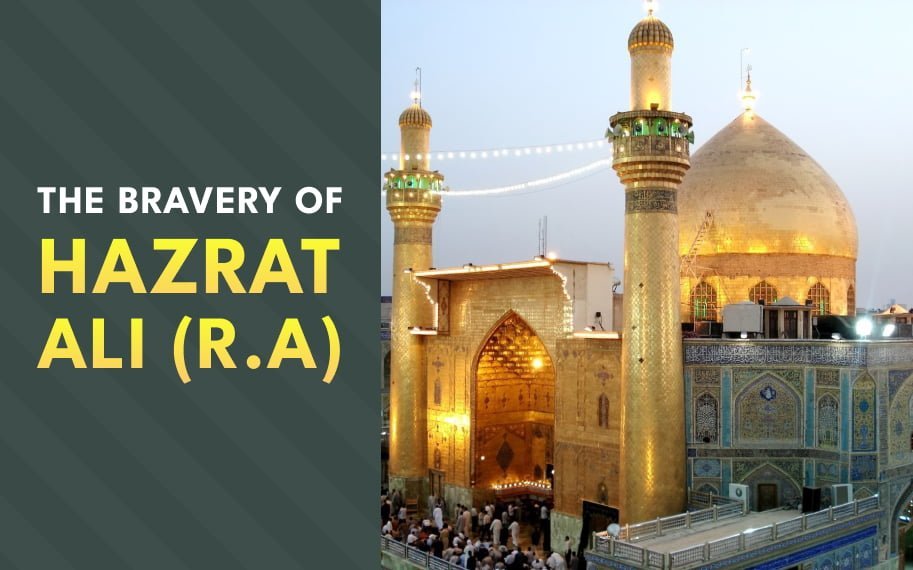
Hazrat Ali’s (R.A.) courage and bravery were unique and unparalleled and will be famously remembered as one of his exclusive qualities. In many battles, he played an influential role in the victory of the Muslims as he defeated many enemies on the battlefields. Hereunder we will look at a few incidents from some of the battles he fought in to get a glimpse of the bravery of this Lion of Allah Ta’ala.
Table of Contents
Battle of Badr
Hazrat Ali’s courage was evident from the very early days of Islam. At the Battle of Badr, he played a pivotal role, fearlessly confronting the enemies of Islam. Despite being outnumbered, Ali’s valor and strategic acumen contributed significantly to the victory, solidifying his reputation as a brave warrior.
The Lion of Uhud
In the Battle of Uhud, when the tide momentarily turned against the Muslims, Hazrat Ali stood resolutely in defense of Prophet Muhammad (PBUH). His unwavering commitment to the Prophet and his fearlessness in the face of adversity earned him the title of “The Lion of Uhud.”
Talha and Zubair Incident
One of the most notable incidents showcasing Hazrat Ali’s bravery occurred during a personal dispute. Hazrat Ali’s opponents, Talha and Zubair, challenged him to a duel. Despite the emotional weight of the situation, Ali approached the duel with a calm demeanor and emerged victorious, sparing the lives of his opponents out of mercy.
Conquest of Khyber
Hazrat Ali’s valor was not limited to the battlefield; it extended to strategic military endeavors. The conquest of Khyber is a prime example where Ali’s tactical brilliance and bravery played a crucial role in the triumph of the Muslim forces.
The Battle of Camel
Hazrat Ali’s courage was further demonstrated in the Battle of Camel, where he found himself in conflict with Aisha, Talha, and Zubair. Despite the emotional strain of battling former allies, Ali exhibited bravery in upholding justice and the principles of Islam.
Martyrdom at Karbala
The pinnacle of Hazrat Ali’s bravery is perhaps best exemplified by the sacrifice of his son, Imam Hussain (R.A), at the Battle of Karbala. While Ali himself did not witness Karbala, his teachings and values instilled the spirit of bravery in his descendants, culminating in the profound sacrifice made by Imam Hussain.
Conclusion
Hazrat Ali’s life is a shining example of unwavering bravery, whether on the battlefield or in personal confrontations. His legacy continues to inspire generations, teaching us the importance of standing firm in the face of injustice and upholding the principles of justice, mercy, and compassion. The unmatched bravery of Hazrat Ali (R.A) remains a guiding light for all who seek inspiration on the path of righteousness in Islam.
FAQs
Q1: What is the significance of Hazrat Ali’s bravery in Islamic history?
A1: Hazrat Ali’s bravery holds immense significance in Islamic history as he played a pivotal role in early battles, demonstrating exceptional courage, strategic acumen, and an unwavering commitment to the principles of Islam.
Q2: How did Hazrat Ali contribute to the Battle of Badr?
A2: Hazrat Ali’s contributions to the Battle of Badr were crucial. Despite being outnumbered, he fearlessly engaged in combat, showcasing both physical bravery and strategic brilliance, ultimately contributing to the victory of the Muslim forces.
Q3: What earned Hazrat Ali the title “The Lion of Uhud”?
A3: Hazrat Ali earned the title “The Lion of Uhud” for his unwavering courage during the Battle of Uhud. While others momentarily faltered, Ali stood firm in protecting Prophet Muhammad (PBUH), becoming a symbol of steadfastness.
Q4: Can you provide examples of Hazrat Ali’s duels and his approach to them?
A4: Hazrat Ali engaged in notable personal duels, including those with Talha and Zubair. Despite being challenged, he displayed not only martial skill but also a remarkable sense of mercy by sparing the lives of his opponents.
Q5: How did Hazrat Ali’s bravery extend into governance during his caliphate?
A5: Hazrat Ali’s bravery in governance was marked by his commitment to justice and principled leadership. Despite facing internal dissent, he upheld Islamic values and fairness, showcasing courage in the face of challenges.
Q6: Did Hazrat Ali witness the events of Karbala, and how did his legacy influence that tragedy?
A6: Hazrat Ali did not witness the events of Karbala. However, his teachings and values deeply influenced his descendants, particularly his son Imam Hussain (R.A), whose sacrifice at Karbala stands as the epitome of courage.
Q7: How does Hazrat Ali’s moral integrity contribute to his legacy of bravery?
A7: Hazrat Ali’s moral integrity was a significant aspect of his bravery. His fearlessness in upholding Islamic principles and standing against injustice left a lasting impact, illustrating that true courage encompasses not only physical strength but also moral fortitude.
Q8: What lessons can Muslims derive from Hazrat Ali’s life regarding bravery?
A8: Muslims can draw lessons from Hazrat Ali’s life, learning that bravery involves not only facing external challenges but also upholding moral principles, exhibiting resilience in governance, and standing against injustice with unwavering commitment to Islam.
Read Also
10 Astonishing Scientific Miracles of the Quran
Best Online Tafseer Course With 3 Free Trial Classes
How to Choose the Right Online Quran Academy
Importance & Benefits of Surah Yaseen
Life of Prophet Muhammad (SAW)
Hazrat Umar (R.A)-Biography, Caliph, Achievements & Death

